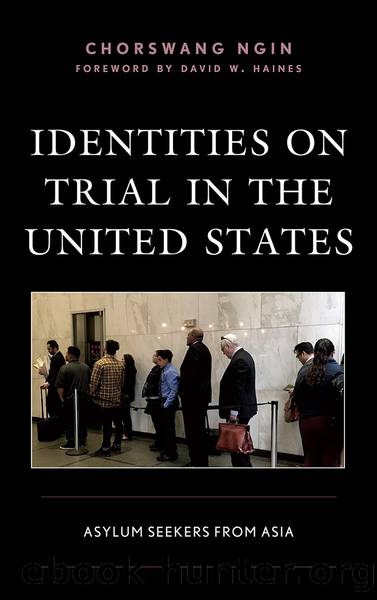Identities on Trial in the United States by Ngin ChorSwang;Yeh Joann;Haines David W.;

Author:Ngin, ChorSwang;Yeh, Joann;Haines, David W.;
Language: eng
Format: epub
ISBN: 9781498574747
Publisher: Lexington Books/Fortress Academic
Published: 2018-08-01T13:20:56+00:00
129Chapter 9
Without Evidence and Without
Witness
When Attorney Goodsell contacted me in 2003 about Mrs. Harianto, we had already successfully completed âprovingâ the âChinese raceâ identity in about a dozen Chinese Indonesian cases. With Mrs. Harianto, there was something else that needed to be addressed besides proving her Chinese Indonesian identity. âSomething happened to Mrs. Harianto, but she wouldnât talk about it.â Mr. Goodsell had informed me, and then he added, âShe has also missed the one-year rule. Perhaps you could talk to her.â Applying for asylum protection within one year is crucial. Those who missed the one-year rule have a difficult time obtaining asylum unless their justifications are extraordinary. In helping Mr. Goodsell on the case, my job was then to find that âextraordinaryâ circumstances that had delayed her asylum application.
Mrs. Harianto, a fifty-two-year-old mother, and her husband, Mr. Harianto, had arrived in the United States on a tourist visa and overstayed after an extension. With expired visas, Mrs. Harianto and her husband were now âout of statusâ and their presence in the United States was illegal. They lived in constant fear of being arrested and deported. To make matters worse, their failure to apply for asylum within a year after arrival made their chances of getting asylum very slim.
I first met the Hariantos in Mr. Goodsellâs office. Their sadness and desperation still haunts me to this day. Something horrific must have happened. She said she had tried to apply for asylum before, but each time she would withdraw her application at the last minute. Despite the passage of time, the trauma remains vivid and painful. Her reluctance to speak about the incident turned into delays, and those delays resulted in missing the one-year rule.
Based on this, how was I going to help Mrs. Harianto with her asylum application? If I was going to address whatever horrible trauma she had experienced as a woman, I had to keep in mind that the Refugee Convention 130does not specifically mention gender as one of its criteria for asylum protection. Instead, women seeking asylum have applied under a category known as âMembership in a Particular Social Groupâ (MPSG). Legal scholars have mentioned women forced into marriage, forced to have an abortion, or forced to have âfemale genital mutilationâ being granted asylum under MPSG. Persecution based on sexual orientation comes under the ground of MPSG as well. However, many scholars have also described MPSG as being confusing, unclear, and marginalizing womenâs representation in court. Women are unable to speak and their trauma remains hidden.
How do I help Mrs. Harianto so that she qualifies under the grounds of MPSG?
In helping asylum seekers prepare a stronger narrative for submission to court, the unspeakable must be spoken, the unarticulated must be articulated, the hidden must be uncovered, and the silence must be broken to make full sense to the adjudicators.
Unsure of how I would argue that whatever had happened to Mrs. Harianto could come under the Refugee Convention ground of MPSG, I decided to learn first what had kept Mrs.
Download
This site does not store any files on its server. We only index and link to content provided by other sites. Please contact the content providers to delete copyright contents if any and email us, we'll remove relevant links or contents immediately.
Cecilia; Or, Memoirs of an Heiress — Volume 1 by Fanny Burney(32548)
Cecilia; Or, Memoirs of an Heiress — Volume 2 by Fanny Burney(31947)
Cecilia; Or, Memoirs of an Heiress — Volume 3 by Fanny Burney(31932)
The Great Music City by Andrea Baker(31917)
We're Going to Need More Wine by Gabrielle Union(19034)
All the Missing Girls by Megan Miranda(15959)
Pimp by Iceberg Slim(14488)
Bombshells: Glamour Girls of a Lifetime by Sullivan Steve(14057)
For the Love of Europe by Rick Steves(13915)
Talking to Strangers by Malcolm Gladwell(13350)
Norse Mythology by Gaiman Neil(13349)
Fifty Shades Freed by E L James(13233)
Mindhunter: Inside the FBI's Elite Serial Crime Unit by John E. Douglas & Mark Olshaker(9324)
Crazy Rich Asians by Kevin Kwan(9279)
The Lost Art of Listening by Michael P. Nichols(7494)
Enlightenment Now: The Case for Reason, Science, Humanism, and Progress by Steven Pinker(7306)
The Four Agreements by Don Miguel Ruiz(6745)
Bad Blood by John Carreyrou(6611)
Weapons of Math Destruction by Cathy O'Neil(6266)
